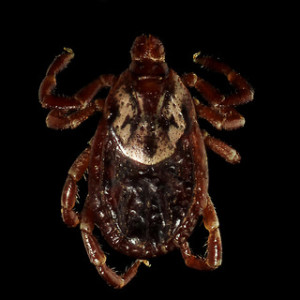The American Dog Tick in New Hampshire and Massachusetts
By Chris Williams on June 26, 2015.

American dog tick female
We hear a lot in the media about the blacklegged tick (= deer tick) that is the vector of Lyme disease. You might think that the blacklegged tick is our most common tick in New Hampshire. Not so. The American dog tick, Dermacentor variabilis, is number one.
Dogs Are a Common Host for the Adult Tick
Like the blacklegged tick, the American dog tick is also a three-host tick with a two-year life cycle. It must find, attach, and feed on an animal three different times to complete its life cycle. The newly hatched or larval ticks feed on a small animal like a mouse. The next nymphal stage feeds on a slightly larger animal like a raccoon or opossum. The final adult stage climbs tall grasses or shrubs to wait for an even larger mammal like a deer, dog, or human. The tick gets its name because it is commonly found attached to dogs.
In New Hampshire, the American dog tick, also known as the wood tick, is most active from May through July. The larval tick can wait for up to 11 months for a small mammal to feed on. Adult ticks can survive for two years while waiting for a host animal.
Fortunately, the American dog tick is easier to see than the much smaller blacklegged tick. An unfed adult tick is about the size of a watermelon seed compared to a sesame seed for the blacklegged tick. The adult American dog tick is reddish-brown with a mottled off-white pattern on the back of the male, and a white “shield” on the back of the female. After feeding, a female tick has greatly increased in size and resembles a gray pinto bean.
Rocky Mountain Spotted Fever is a Rare Complication
Although the American dog tick does not spread Lyme disease to people, it is responsible for transmitting Rocky Mountain spotted fever. Fortunately, this disease is not as common in New England as it is farther south. In Massachusetts, cases occur most often in the southeastern part of the state, on Cape Cod, or on Martha’s Vineyard. The American dog tick can also transmit tularemia and can cause a temporary condition called tick paralysis.
Protect your family and pets from American dog ticks and blacklegged ticks by taking proactive measures in your yard (see Creating a Tick-Free Zone in Your Yard – Advice From the Pros).
Photo credit: Twiztedminds / Foter / CC BY